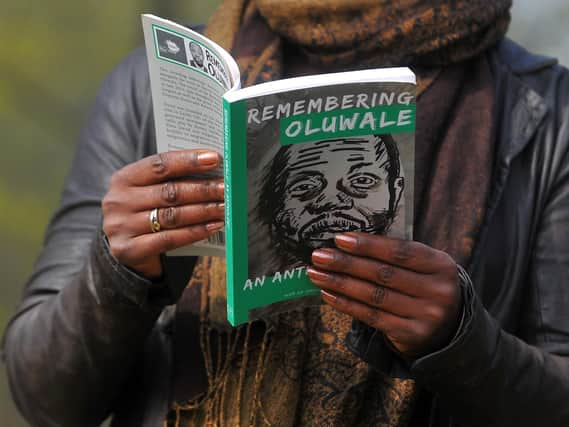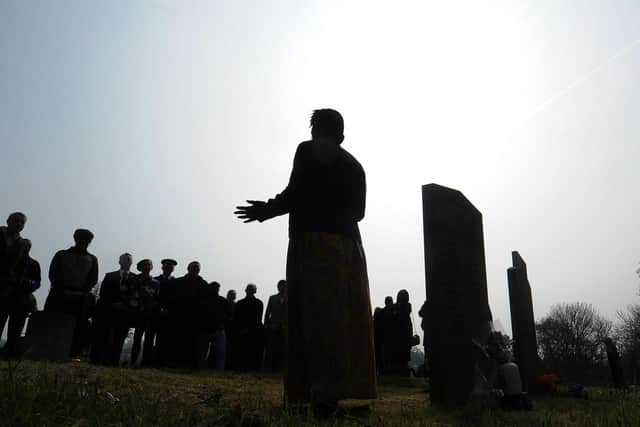Blue plaque for David Oluwale would be powerful statement about ending racial injustice - Anthony Clavane


Oh, those heady days in early March when you could still enjoy an elbow bump, foot tap or even a reticent Yorkshire nod with fellow lovers of the spoken word – and experience seeing and hearing your favourite writers in the flesh.
In the two events I took part in, and another I was in the audience for, my lifelong curiosity in blue plaques was piqued.
Advertisement
Hide AdAdvertisement
Hide AdStatues have been in the news of late, with the Black Lives Matter movement prompting an important national conversation about Britain’s colonial past, but I like my public landmarks to be more discrete and less in your face.


One of the talks, in which I interviewed the distinguished sportswriter Duncan Hamilton, took place at Leeds Library. Established in 1768, it is the oldest surviving subscription library of its type in the country.
Despite its location on one of the town centre’s busiest shopping streets, the plaque – commemorating a cultural hidden gem – is so discrete you would miss it if you blinked.
In complete contrast I enjoyed a drink or two with Jonny Magnanti at Holbeck Working Men’s Club after the actor’s moving performance of Tony Harrison’s epic poem V.
Advertisement
Hide AdAdvertisement
Hide AdThe south Leeds venue, which opened its current premises in 1878 and is now home to the magnificent Slung Low theatre company, boasts a plaque which marks the oldest continuously-opened working men’s club in the UK.
And finally, at Hunslet Community Hub, I nervously climbed a stepladder – as I get older my fear of heights intensifies – to unveil a blue plaque celebrating local-boy-made-good Keith Waterhouse.
The acclaimed novelist, playwright and journalist is one of my literary heroes and, as I made a short speech in his honour, it crossed my mind that there were other figures equally deserving of such recognition.
Earlier this week I read that all statues of historic figures in Leeds were being subject to a city-wide review by the council.
Advertisement
Hide AdAdvertisement
Hide AdIn one story the first black Lord Mayor of Leeds, Councillor Eileen Taylor, was quoted as saying: “We want everyone to know that Leeds is a diverse city that celebrates every single one of its residents and is extremely proud of the wide range of cultures, ethnic backgrounds and differences that make the city the wonderful place it is.”
With London mayor Sadiq Khan announcing a commission to ensure public landmarks represent the capital’s diversity, now would be a perfect moment to support the blue plaque campaign for David Oluwale.
For those unaware of this tragic story, can I recommend Kester Aspden’s brilliant award-winning book about the first black man to die in police custody in the UK.
Oluwale’s body was recovered from the River Aire in 1969; as Aspden so shockingly reveals, the homeless British-Nigerian man had been “hounded to his death” by police in Leeds.
Advertisement
Hide AdAdvertisement
Hide AdThere have been 1,741 deaths in police custody, or following contact with officers, in England and Wales over the past 30 years; according to the charity Inquest, black men have been disproportionately affected. Astonishingly, not one officer has been prosecuted, let alone convicted, for deaths of this type since Oluwale’s death.
In his recent blog, Max Farrar, secretary of The David Oluwale Memorial Association, wrote: “In Leeds, we must re-double our struggle to transform the structures of this great city so that it becomes one where everyone is cherished, irrespective of their ethnicity; where everyone is treated equally, irrespective of their status; where diversity is negotiated, respectfully;
and the arts, joy and hope flourish.”
David Oluwale’s story remains one of my home city’s most shameful episodes. Remarkably, some commentators have argued that the issues Black Lives Matter activists are protesting about are specific only to the US. They seem to forget that, since 2015, 33 BAME people have died in police custody in the UK.
At a time when protest has erupted all over the world following the horrific killing of George Floyd, the erection of a blue plaque in memory of Oluwale would surely make a powerful statement about ending racial injustice.
Advertisement
Hide AdAdvertisement
Hide AdEditor’s note: first and foremost - and rarely have I written down these words with more sincerity - I hope this finds you well.
Almost certainly you are here because you value the quality and the integrity of the journalism produced by The Yorkshire Post’s journalists - almost all of which live alongside you in Yorkshire, spending the wages they earn with Yorkshire businesses - who last year took this title to the industry watchdog’s Most Trusted Newspaper in Britain accolade.
And that is why I must make an urgent request of you: as advertising revenue declines, your support becomes evermore crucial to the maintenance of the journalistic standards expected of The Yorkshire Post. If you can, safely, please buy a paper or take up a subscription. We want to continue to make you proud of Yorkshire’s National Newspaper but we are going to need your help.
Postal subscription copies can be ordered by calling 0330 4030066 or by emailing [email protected]. Vouchers, to be exchanged at retail sales outlets - our newsagents need you, too - can be subscribed to by contacting subscriptions on 0330 1235950 or by visiting www.localsubsplus.co.uk where you should select The Yorkshire Post from the list of titles available.
Advertisement
Hide AdAdvertisement
Hide AdIf you want to help right now, download our tablet app from the App / Play Stores. Every contribution you make helps to provide this county with the best regional journalism in the country.
Sincerely. Thank you.
James Mitchinson
Editor